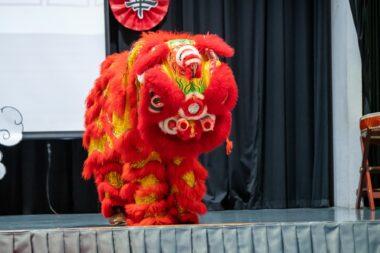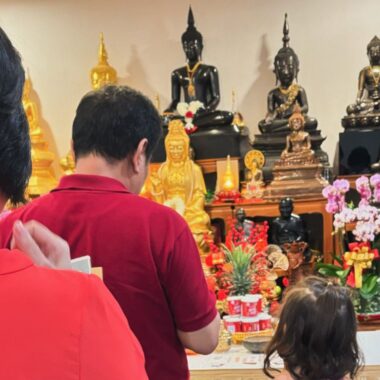Learning to embrace the unexpected in life with AADC deficiency
Our Chinese New Year celebrations went better than we anticipated
Written by |

Chinese New Year celebrations are a two-week extravaganza filled with food and excitement that can overwhelm the senses.
Our daughter, Rylae-Ann, was born with aromatic l-amino acid decarboxylase (AADC) deficiency. This rare disease required my wife, Judy, and I to work as a team to keep our daughter alive. Among the many symptoms, anxiety was always a difficult factor for us to manage.
We normally take a more reserved path to holiday celebrations, given Rylae-Ann’s consistent propensity to run and scream during many events that throw off her schedule. The easiest thing for us to do as parents is to make our usual decision to travel. In a way, we’re running away, too.
This year, we’re taking a different approach by traveling less and enjoying the moment. Because we are staying put, we’ve tried to get more involved with family and friends. The change brought some unexpected results.
Fireworks, drums, and cheers
Chinese New Year is filled with loud noises based on the tradition of scaring away the mythical beast known as Nian. This brings the community safety and a good year to come. For anyone with anxiety or sensory processing disorders, it is the complete opposite.

Rylae-Ann watched her school’s lion dancers perform a show as other students played drums and symbols. (Photo by Richard E. Poulin III)
We have been working with Rylae-Ann on her sensory issues and decided to let her venture further into the celebrations. Judy and I didn’t push her, but we explained along the way what would happen.
When the first line of firecrackers went off, her eyes popped open. A glimmer of fear faded across her face, but she looked up at us. We gave her a reassuring nod and a smile. From there, she watched on with a smile as well.
Out came lion dancers, drums, and, of course, more firecrackers. With each activity, she clapped along. Our day was shorter than it was for the other kids, but we were pleasantly surprised at how involved Rylae-Ann was.
Midnight blessings
Like New Year’s in the West, Chinese New Year’s Eve is a night when family and friends gather. However, the latter is much more conservative and reserved, and is centered around prayers and blessings.
Judy and I used to gather with her family at the temple for a midnight blessing before Rylae-Ann was born. There is a lot of chanting, incense, and kneeling. It challenged my patience as an adult, and we never imagined Rylae-Ann would be able to participate.
But because we were home this Chinese New Year, we decided to give it a try. Judy and I agreed on a game plan for how we would handle Rylae-Ann during the ceremony and what we would do if we needed to make a quick exit. However, this was all unnecessary.

Rylae-Ann completes the Chinese New Year ceremony by praying and receiving blessings alongside her grandparents. (Photo by Richard E. Poulin III)
As soon as we met with family and friends, they coddled Rylae-Ann and showered her with love. Throughout the ceremony, Rylae-Ann was genuinely interested. There were moments when she broke protocol and went up to the Buddha statues as the monk bellowed out chants, but everyone was very understanding.
Rylae-Ann stayed awake past midnight. We treat her schedule like a rigid doctrine, and sleep is considered medicine; we never miss a dose. This is all predicated on it being essential. For the most part, it is, but it’s also important to leave room to try new things.
Often, Judy and I err on the side of caution and proceed with what we know. But we need to remember that at the beginning of our AADC deficiency journey with Rylae-Ann, we were very open-minded. We explored, tried new things, and considered all options.
Although today we are very experienced, it’s important that we also leave space to be surprised. As we continue to cherish the small moments, our family also will embrace the unexpected.
Note: AADC News is strictly a news and information website about the disease. It does not provide medical advice, diagnosis, or treatment. This content is not intended to be a substitute for professional medical advice, diagnosis, or treatment. Always seek the advice of your physician or other qualified health provider with any questions you may have regarding a medical condition. Never disregard professional medical advice or delay in seeking it because of something you have read on this website. The opinions expressed in this column are not those of AADC News or its parent company, Bionews, and are intended to spark discussion about issues pertaining to aromatic l-amino acid decarboxylase deficiency.





Leave a comment
Fill in the required fields to post. Your email address will not be published.